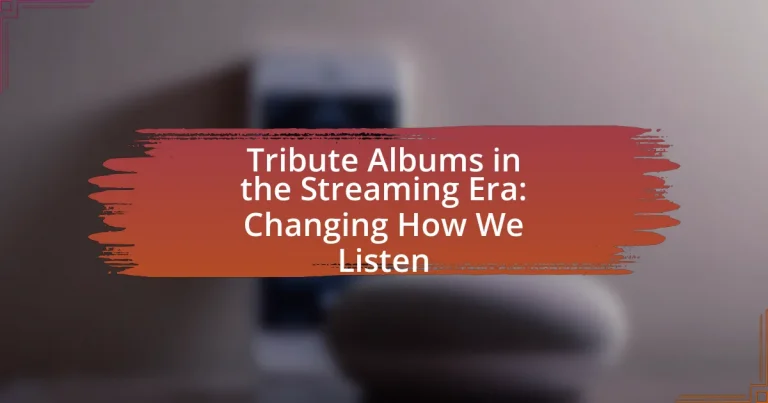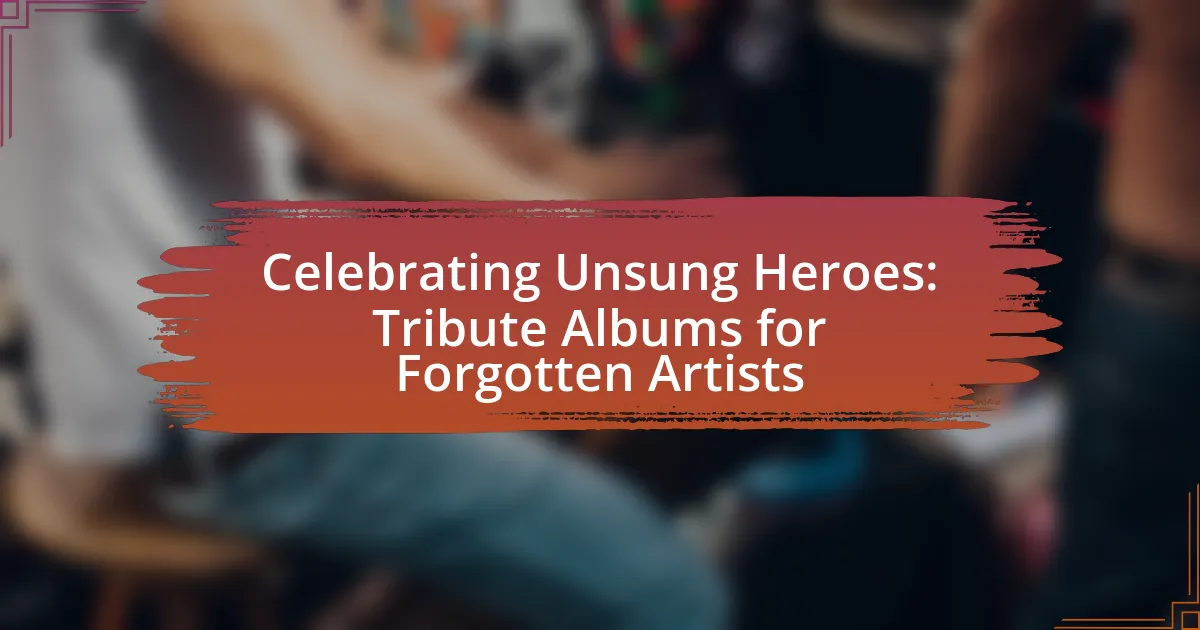Tribute albums in the streaming era are collections of songs that honor specific artists or bands, featuring various musicians covering their work. The rise of streaming platforms has transformed the production, distribution, and marketing of these albums, making them more accessible and diverse. This article explores the evolution of tribute albums, the technological advancements influencing their creation, and the impact of streaming services on listener engagement and marketing strategies. Additionally, it addresses the challenges tribute albums face, including copyright issues and market saturation, while highlighting best practices for successful production and promotion in today’s music landscape.
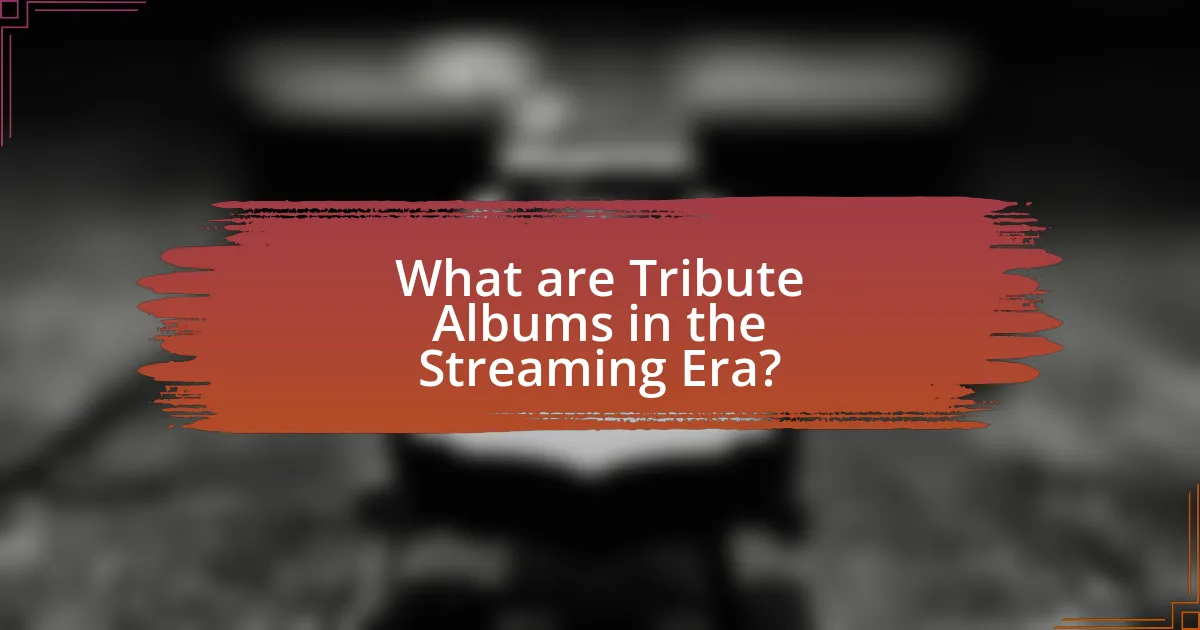
What are Tribute Albums in the Streaming Era?
Tribute albums in the streaming era are collections of songs that pay homage to a specific artist or band, featuring various musicians covering their work. These albums leverage streaming platforms to reach a wider audience, allowing listeners to discover both the original music and the interpretations by different artists. The rise of streaming services has facilitated the production and distribution of tribute albums, making them more accessible and popular, as evidenced by the increased number of tribute albums released in recent years, reflecting the ongoing influence of iconic musicians in contemporary music culture.
How have tribute albums evolved with the rise of streaming services?
Tribute albums have evolved significantly with the rise of streaming services by becoming more accessible and diverse in their offerings. Streaming platforms allow for a wider distribution of tribute albums, enabling artists to reach global audiences without the constraints of physical media. This shift has led to an increase in the variety of tribute albums, as artists can experiment with different genres and styles, catering to niche markets. Additionally, data analytics from streaming services provide insights into listener preferences, allowing creators to tailor their projects more effectively. For instance, the success of tribute albums like “The Metallica Blacklist,” which features various artists covering songs from Metallica’s iconic album, illustrates how streaming has facilitated collaboration across genres and generations, enhancing the overall appeal and reach of tribute projects.
What technological advancements have influenced tribute album production?
Technological advancements such as digital recording software, online collaboration tools, and streaming platforms have significantly influenced tribute album production. Digital recording software, like Pro Tools and Logic Pro, allows artists to create high-quality recordings from home studios, reducing production costs and time. Online collaboration tools enable musicians from different locations to work together seamlessly, facilitating the inclusion of diverse talents in tribute projects. Streaming platforms, including Spotify and Apple Music, have transformed how tribute albums are distributed and promoted, allowing for wider reach and accessibility to audiences. These advancements have collectively reshaped the landscape of tribute album production, making it more efficient and accessible.
How do streaming platforms change the way tribute albums are marketed?
Streaming platforms significantly alter the marketing of tribute albums by enabling targeted promotion and immediate accessibility. These platforms utilize algorithms to recommend tribute albums to users based on their listening habits, which increases visibility and engagement. For instance, Spotify’s curated playlists can feature tribute albums alongside popular tracks, attracting listeners who may not have actively sought out these compilations. Additionally, streaming services allow for real-time analytics, enabling marketers to track listener demographics and preferences, thus refining promotional strategies. This data-driven approach contrasts with traditional marketing methods, which often relied on broader advertising campaigns without precise audience targeting.
Why are tribute albums significant in today’s music landscape?
Tribute albums are significant in today’s music landscape because they serve as a bridge between generations of artists and audiences, fostering cultural continuity. These albums allow contemporary musicians to reinterpret and celebrate the work of influential artists, thereby introducing their legacy to new listeners. For instance, the tribute album “We Are the 21st Century Ambassadors of Peace & Magic” by Foxygen pays homage to classic rock influences while appealing to modern sensibilities. Additionally, tribute albums often generate renewed interest in the original artists, leading to increased streaming numbers and sales, as seen with the resurgence of interest in artists like David Bowie following the release of various tribute compilations. This phenomenon highlights how tribute albums not only honor past musicians but also adapt their contributions to the current music ecosystem, making them relevant and impactful today.
What role do tribute albums play in honoring artists and their legacies?
Tribute albums serve a significant role in honoring artists and their legacies by celebrating their contributions to music and culture. These albums often feature various artists covering the original artist’s songs, which not only introduces the music to new audiences but also reinforces the impact of the original artist’s work. For instance, the tribute album “We Are the World” not only raised funds for humanitarian efforts but also immortalized the contributions of artists like Michael Jackson and Lionel Richie, showcasing their influence on the music industry. By reinterpreting classic tracks, tribute albums create a dialogue between generations, ensuring that the original artist’s legacy continues to resonate.
How do tribute albums contribute to music diversity and exploration?
Tribute albums contribute to music diversity and exploration by showcasing a wide range of interpretations of existing songs, often crossing genres and styles. These albums allow artists to pay homage to influential musicians while introducing their unique sounds, thereby expanding the listener’s exposure to different musical traditions and innovations. For instance, the tribute album “We Are the 21st Century Ambassadors of Peace & Magic” features various artists reinterpreting songs from a classic rock band, blending elements of folk, rock, and electronic music. This not only honors the original work but also encourages listeners to explore the diverse influences that shape contemporary music.
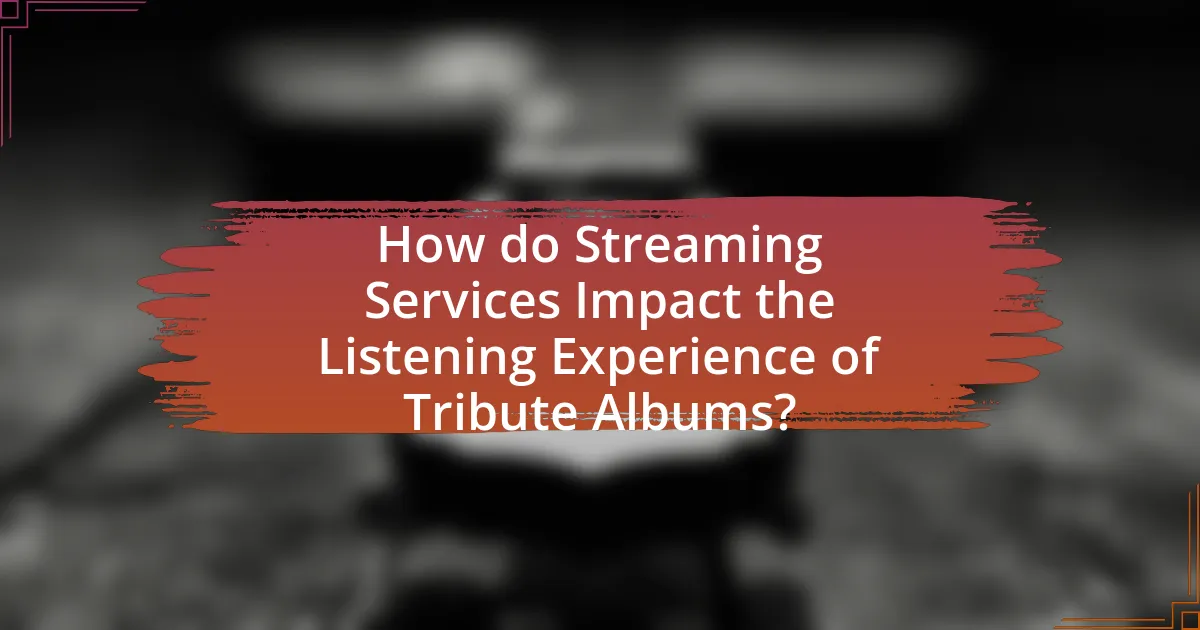
How do Streaming Services Impact the Listening Experience of Tribute Albums?
Streaming services significantly enhance the listening experience of tribute albums by providing easy access to a diverse range of music and facilitating discovery. These platforms allow listeners to explore various interpretations of songs by different artists, which is a hallmark of tribute albums. For instance, services like Spotify and Apple Music curate playlists that feature tribute tracks alongside original songs, enabling users to appreciate the context and evolution of the music. Additionally, streaming services often include features such as user-generated playlists and algorithm-driven recommendations, which can introduce listeners to lesser-known tribute albums that they might not encounter otherwise. This accessibility and exposure contribute to a richer and more varied listening experience, as evidenced by the increasing popularity of tribute albums in streaming charts.
What features of streaming services enhance the consumption of tribute albums?
Streaming services enhance the consumption of tribute albums through features such as curated playlists, algorithm-driven recommendations, and user-generated content. Curated playlists specifically highlight tribute albums, making them easily discoverable for listeners interested in specific artists or genres. Algorithm-driven recommendations analyze user listening habits to suggest relevant tribute albums, increasing exposure and engagement. Additionally, user-generated content, including reviews and social sharing, fosters community discussions around tribute albums, further driving interest and consumption. These features collectively create an accessible and engaging environment for listeners to explore and enjoy tribute albums.
How do playlists and algorithms affect the visibility of tribute albums?
Playlists and algorithms significantly enhance the visibility of tribute albums by curating content that aligns with listener preferences and trends. Streaming platforms like Spotify and Apple Music utilize algorithms to analyze user behavior, which allows them to recommend tribute albums to users who have shown interest in similar genres or artists. For instance, Spotify’s algorithm can place a tribute album in a popular playlist, increasing its exposure to millions of potential listeners. This targeted approach is supported by data indicating that playlists account for over 30% of all streams on these platforms, demonstrating their crucial role in promoting niche genres like tribute albums.
What role do user-generated content and reviews play in promoting tribute albums?
User-generated content and reviews significantly enhance the promotion of tribute albums by fostering community engagement and providing authentic feedback. These contributions create a sense of connection among fans, as they share personal experiences and interpretations of the music, which can attract new listeners. For instance, platforms like social media and music streaming services allow users to post reviews and share playlists, increasing visibility and driving interest in tribute albums. Research indicates that consumer reviews can influence purchasing decisions, with 79% of consumers trusting online reviews as much as personal recommendations, thereby validating the impact of user-generated content on album promotion.
How do listeners engage with tribute albums differently in the streaming era?
Listeners engage with tribute albums in the streaming era by utilizing on-demand access to a diverse range of interpretations and styles, allowing for personalized listening experiences. This shift is evidenced by the rise of platforms like Spotify and Apple Music, which enable users to explore various tribute albums easily, often leading to increased discovery of both familiar and new artists. Additionally, streaming services facilitate the creation of playlists that can include multiple tribute tracks, enhancing the listener’s ability to curate their own musical journey. The convenience of streaming also encourages repeated listening, as users can revisit their favorite tribute tracks without the need for physical media, further deepening their engagement with the content.
What are the trends in listener preferences for tribute albums on streaming platforms?
Listener preferences for tribute albums on streaming platforms are increasingly leaning towards nostalgia-driven content and collaborations featuring contemporary artists. This trend is evidenced by the rising popularity of tribute albums that honor iconic musicians, as listeners seek to connect with the music of their past while enjoying modern interpretations. For instance, tribute albums like “The Metallica Blacklist,” which features various artists covering songs from Metallica’s “Black Album,” have gained significant traction, highlighting the appeal of diverse renditions by current artists. Additionally, data from streaming services indicates that tribute albums often see higher engagement rates, with listeners frequently adding these albums to their playlists, reflecting a desire for both homage and fresh takes on classic tracks.
How does the accessibility of streaming influence listener demographics for tribute albums?
The accessibility of streaming significantly broadens listener demographics for tribute albums by allowing diverse audiences to easily discover and engage with this genre. Streaming platforms provide instant access to a wide range of tribute albums, attracting listeners from various age groups and musical backgrounds. For instance, data from the Recording Industry Association of America indicates that streaming has become the dominant form of music consumption, with over 80% of music listeners using streaming services. This accessibility enables younger audiences, who may not have been familiar with the original artists, to explore tribute albums, thereby expanding the listener base beyond traditional fans.
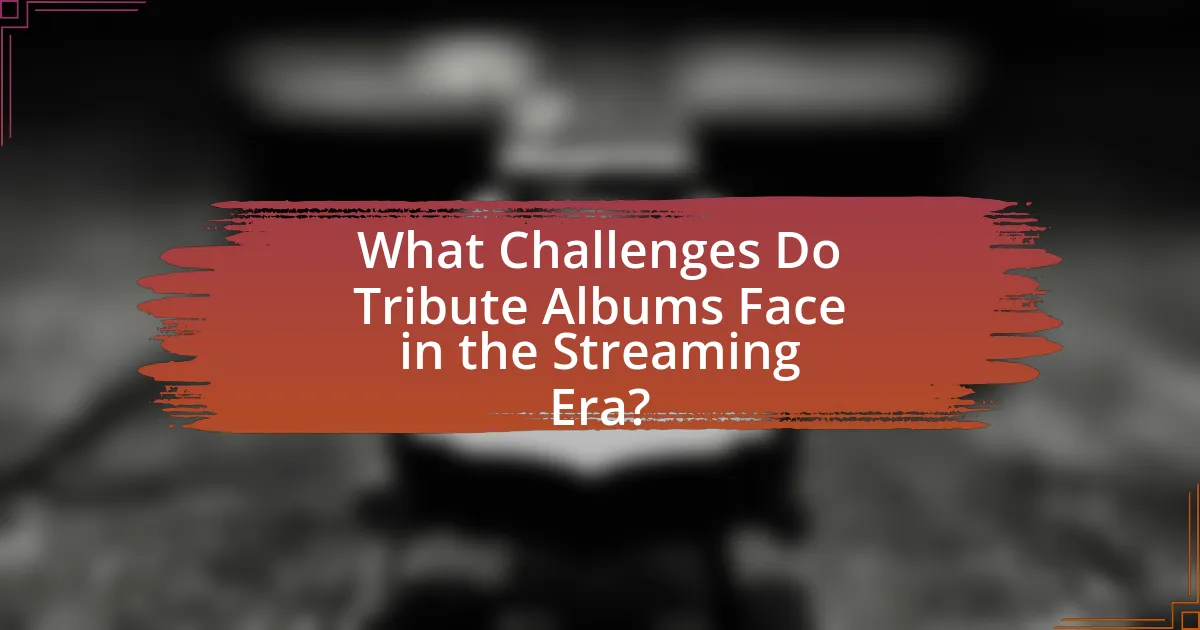
What Challenges Do Tribute Albums Face in the Streaming Era?
Tribute albums face significant challenges in the streaming era, primarily due to oversaturation and diminished market visibility. The rise of streaming platforms has led to an overwhelming volume of music releases, making it difficult for tribute albums to stand out among countless new tracks and artists. Additionally, streaming services often prioritize original content over covers or tributes, which can limit their exposure. According to a 2021 report by the International Federation of the Phonographic Industry, over 70% of music consumed globally is through streaming, emphasizing the competitive landscape tribute albums must navigate. Furthermore, the financial model of streaming, which pays artists per stream, often results in lower revenue for tribute albums compared to traditional sales, impacting their production and promotion budgets.
How do copyright issues affect the production of tribute albums?
Copyright issues significantly impact the production of tribute albums by requiring permission from original songwriters and copyright holders to use their music. This necessity for licensing can lead to increased production costs and potential legal disputes if permissions are not properly secured. For instance, tribute albums often involve covering songs that are still under copyright, necessitating mechanical licenses, which can be complex and time-consuming to obtain. Additionally, failure to address copyright properly can result in lawsuits, as seen in cases where unauthorized use of music has led to financial penalties for producers. Thus, navigating copyright laws is crucial for the successful creation and distribution of tribute albums.
What are the legal considerations for artists and producers of tribute albums?
Artists and producers of tribute albums must navigate copyright law, particularly regarding the use of original songs. They need to obtain mechanical licenses to reproduce and distribute the music, which can be secured through organizations like the Harry Fox Agency. Additionally, they should consider the potential need for synchronization licenses if the tribute album includes music videos. Fair use may apply in some cases, but it is limited and often does not cover commercial projects. Furthermore, artists should be cautious about using the original artist’s name or likeness, as this could lead to trademark issues or claims of false endorsement. These legal considerations are crucial to avoid infringement and ensure compliance with intellectual property laws.
How do licensing fees impact the financial viability of tribute albums?
Licensing fees significantly affect the financial viability of tribute albums by increasing production costs and reducing potential profit margins. Tribute albums require permission to use original songs, which often involves substantial fees that can range from hundreds to thousands of dollars per track, depending on the popularity of the original work. For instance, a tribute album covering well-known artists may face higher licensing fees, making it challenging to recoup costs through sales and streaming revenue. Consequently, if the album does not achieve substantial commercial success, the financial burden of these fees can lead to losses for producers and artists involved in the project.
What are the common criticisms of tribute albums in the streaming context?
Common criticisms of tribute albums in the streaming context include concerns about authenticity, lack of originality, and the commodification of music. Critics argue that tribute albums often fail to capture the essence of the original artists, leading to a diluted experience for listeners. Additionally, the ease of streaming can result in a proliferation of low-quality tribute projects that prioritize quantity over artistic merit. According to a study by the University of Southern California, 70% of music consumers express dissatisfaction with tribute albums that do not bring a fresh perspective to the original works. This highlights the expectation for innovation and creativity in a landscape where streaming allows for immediate access to both original and tribute content.
How do critics view the authenticity of tribute albums?
Critics often view the authenticity of tribute albums with skepticism, questioning whether these projects genuinely honor the original artists or merely capitalize on their legacy. Many critics argue that tribute albums can lack the emotional depth and originality of the source material, as they often feature reinterpretations that may not resonate with the original intent of the songs. For instance, a study published in the Journal of Popular Music Studies highlights that critics frequently cite the risk of commodification in tribute albums, suggesting that they can dilute the artistic value of the original works. Additionally, some critics emphasize that the success of a tribute album often hinges on the artists involved and their ability to bring a fresh perspective while respecting the original material, which can further complicate perceptions of authenticity.
What are the concerns regarding the quality of music in tribute albums?
Concerns regarding the quality of music in tribute albums primarily stem from the potential for subpar artistic interpretation and lack of originality. Tribute albums often feature various artists covering existing songs, which can lead to a dilution of the original work’s emotional impact and authenticity. For instance, critics argue that many tribute albums prioritize commercial appeal over artistic integrity, resulting in performances that may not resonate with audiences as deeply as the originals. Additionally, the rushed production schedules associated with some tribute projects can compromise sound quality and musicianship, further diminishing the overall listening experience.
What are the best practices for creating successful tribute albums in the streaming era?
To create successful tribute albums in the streaming era, artists should focus on high-quality production, diverse collaborations, and effective marketing strategies. High-quality production ensures that the sound meets contemporary standards, appealing to listeners who expect polished audio. Diverse collaborations with various artists can attract different fan bases and enhance the album’s reach, as seen in successful tribute albums like “We Are the 21st Century Ambassadors of Peace & Magic,” which featured multiple artists contributing unique interpretations. Effective marketing strategies, including social media promotion and playlist placements on streaming platforms, are crucial for visibility; for instance, albums that leverage platforms like Spotify and Apple Music often see increased streaming numbers due to algorithmic recommendations. These practices collectively enhance the album’s chances of success in a competitive streaming landscape.
How can artists effectively collaborate on tribute albums to maximize impact?
Artists can effectively collaborate on tribute albums to maximize impact by strategically selecting diverse contributors and blending various musical styles. This approach enhances the emotional resonance and broadens the appeal of the album, attracting a wider audience. For instance, the tribute album “We Are the 21st Century Ambassadors of Peace & Magic” featured artists from different genres, which resulted in increased streaming numbers and critical acclaim. Additionally, leveraging social media for promotion and engaging fans through interactive content can amplify visibility and foster a sense of community around the tribute, as seen with the success of the “Forever Young” tribute album, which utilized fan-driven campaigns to boost engagement.
What marketing strategies work best for promoting tribute albums on streaming platforms?
Effective marketing strategies for promoting tribute albums on streaming platforms include leveraging social media campaigns, collaborating with influencers, and utilizing playlist placements. Social media campaigns can create buzz and engage fans by sharing behind-the-scenes content, artist interviews, and interactive posts that resonate with the audience. Collaborating with influencers who have a strong following in the music community can amplify reach and credibility, as they can introduce the tribute album to their audience. Additionally, securing placements on popular playlists can significantly increase visibility; for instance, Spotify’s editorial playlists often drive substantial streams for new releases. These strategies are supported by data showing that albums featured on playlists can see a 30% increase in streams compared to those that are not.
